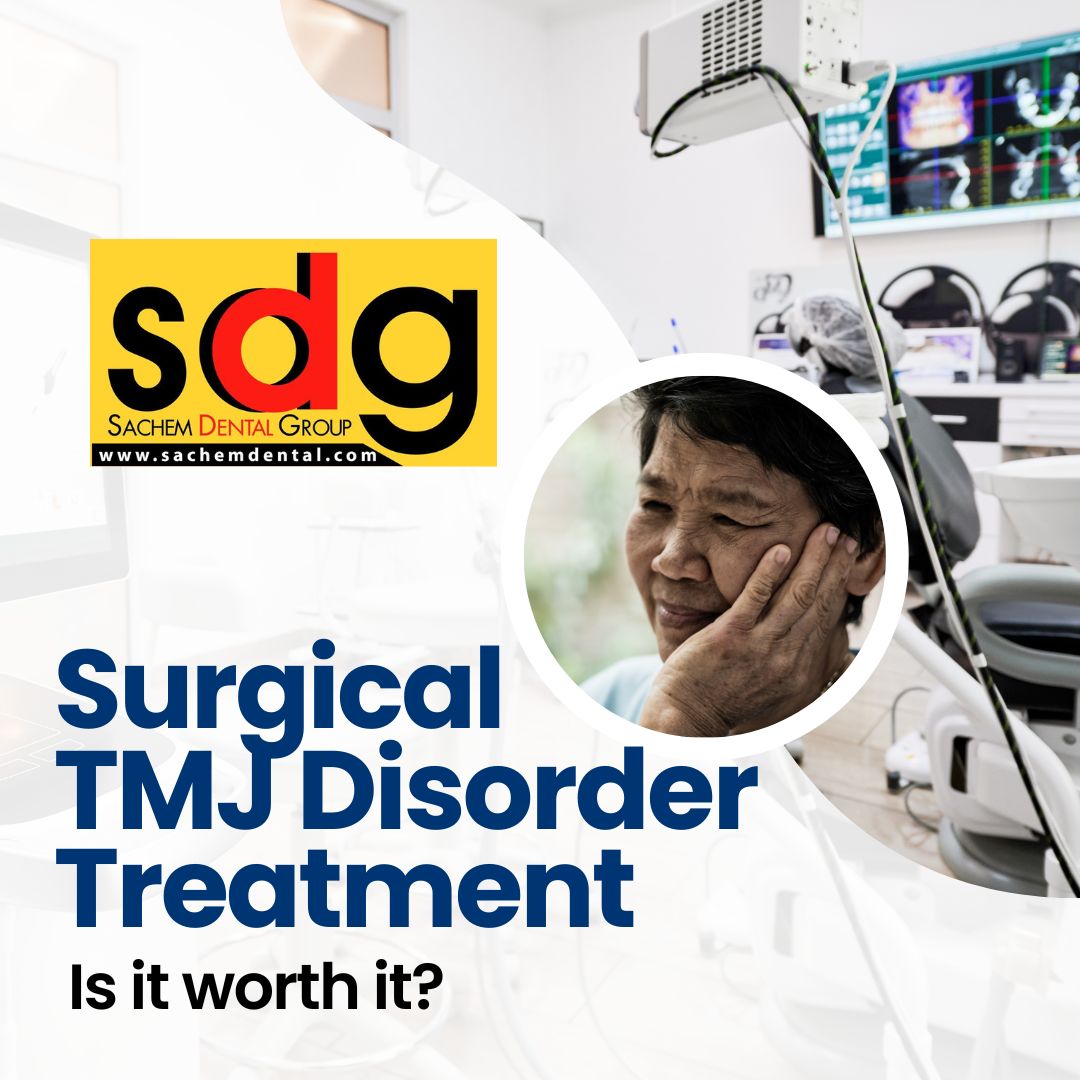
Temporomandibular joint (TMJ) disorder can significantly impact a person’s quality of life, causing pain, discomfort, and limited jaw movement. While non-surgical treatment options are typically recommended as the first line of intervention, there are instances where TMJ surgery becomes necessary. At Sachem Dental Group in Long Island (Suffolk County), our team of experienced dental professionals understands the complexities of TMJ disorder but typically recommends non-surgical treatments whenever possible. That being said, it’s important to understand the factors that determine the severity of TMJ disorder, when surgery may be required, what to expect during the surgical process and recovery, the success rates of TMJ surgery, alternative treatments, and the importance of seeking professional help for TMJ pain.
How Severe is My TMJ Disorder?
Determining the severity of TMJ disorder requires a thorough evaluation by a dental professional. During your appointment at Sachem Dental Group, our team will assess your symptoms, review your medical history, and perform a comprehensive examination. This may include diagnostic imaging, such as X-rays or advanced imaging techniques, to assess the jaw joint’s condition and identify any structural abnormalities.
When Does Someone Need TMJ Surgery?
Surgical intervention for TMJ disorder is typically considered when conservative treatments have been unsuccessful or when the condition has reached an advanced stage. Some situations where TMJ surgery may be necessary include:
Severe jaw joint damage:
If the TMJ is significantly damaged or degenerated, surgery may be required to repair or replace the joint.
Jaw misalignment:
When the jaw is improperly aligned due to a structural abnormality or trauma, surgery may be necessary to correct the alignment and improve jaw function.
Persistent pain and dysfunction:
If TMJ symptoms persist despite non-surgical treatments, surgery may be recommended to alleviate pain, improve jaw mobility, and restore normal function.
TMJ Surgery and Recovery: What to Expect
TMJ surgery is typically performed by an oral and maxillofacial surgeon or a specialized dentist with expertise in TMJ disorders. The specific surgical approach will depend on the individual’s unique needs and the nature of their condition. Some common surgical procedures include:
Arthroscopy:
This minimally invasive procedure involves inserting a small camera into the joint space to visualize and repair damaged tissues.
Joint Replacement:
In severe cases where the joint is extensively damaged, a joint replacement surgery may be performed to replace the damaged joint with an artificial joint.
Jaw Repositioning:
If the jaw is misaligned, orthognathic surgery may be performed to reposition the jaw, correct the bite, and improve overall jaw function.
Recovery from TMJ surgery varies depending on the procedure performed. Your oral surgeon will provide detailed instructions on post-operative care, including pain management, dietary restrictions, and oral hygiene practices. It’s important to follow these instructions closely to ensure a smooth recovery process. Physical therapy may also be recommended to restore jaw function and optimize healing.
How Successful is TMJ Surgery?
The success of TMJ surgery depends on several factors, including the specific procedure performed, the severity of the TMJ disorder, and the individual’s overall health. While TMJ surgery can provide significant relief for many patients, it’s important to note that it may not completely eliminate all symptoms or guarantee a cure. It’s crucial to have realistic expectations and maintain open communication with your oral surgeon throughout the treatment process. Unfortunately, experts do state that surgical TMJ procedures do not typically offer the highest level of success rates as what patients might hope from them. As a result, dental specialists and TMJ experts nearly always recommend non-surgical intervention for managing TMJ related issues such as joint pain.
Alternatives to TMJ Surgery:
Non-surgical treatments are typically explored before considering TMJ surgery. Sachem Dental Group offers a range of conservative approaches to manage TMJ disorder and may recommend services including:
Oral appliances:
Custom-made oral appliances, such as splints or mouthguards, can help alleviate symptoms by reducing pressure on the TMJ and promoting proper jaw alignment.
Physical therapy and massage:
Therapeutic exercises and techniques can improve jaw mobility, strengthen jaw muscles, and relieve pain.
Medications:
Nonsteroidal anti-inflammatory drugs (NSAIDs) and muscle relaxants may be prescribed to alleviate pain and reduce inflammation.
Orthodontic treatment:
Adjusting the bite alignment of your teeth and jaws can help reduce atypical joint motions and alleviate TMJ pressure.
Injectables:
In some cases, injectable medications such as Botox can be helpful for natural muscle tension relief around the TMJ.
When to See a Dentist About TMJ Surgery:
If you experience persistent jaw pain, clicking or popping sounds, difficulty opening or closing your mouth, or other symptoms indicative of TMJ disorder, it is crucial to seek professional help. Visiting Sachem Dental Group for a comprehensive evaluation will allow our dental team to assess your condition, determine the appropriate treatment plan, and guide you towards the most suitable course of action, whether it’s non-surgical management or surgical intervention.
Non-Surgical TMJ Treatment in Long Island:
At Sachem Dental Group, we are committed to providing the highest quality dental care and comprehensive TMJ treatment options to our patients in Long Island (Suffolk County). Our experienced team of dental professionals will thoroughly assess your TMJ disorder and recommend the most suitable treatment plan tailored to your individual needs. We understand the importance of exhausting non-surgical options before considering surgery and strive to provide conservative, effective, and minimally invasive approaches whenever possible.
TMJ Pain? Contact Us Today
While non-surgical treatment options are often the first choice for managing TMJ disorder, there are instances where surgical intervention becomes necessary. At Sachem Dental Group, we offer a variety of TMJ treatment options for patients in Long Island (Suffolk County) who require advanced care. Our experienced team will evaluate the severity of your TMJ disorder and recommend the most appropriate treatment plan, whether it involves surgery or non-surgical intervention.
If you are experiencing TMJ pain or discomfort, don’t hesitate to schedule an appointment with our dental professionals. We are here to provide exceptional care, guide you through the treatment process, and help you find relief from TMJ symptoms. Request your first appointment today.
